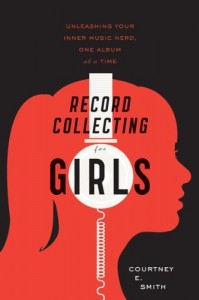Record Collecting For Girls: Unleasing Your Inner Music Nerd, One Album at a Time by Courtney E. Smith
Category: 50 Books
Record Collecting For Girls comes out September 6, 2011
The title makes it sound like this book is a music guide for girls. It is not. It reads more like a memoir about her history with music as well as some general music history thrown in.
There were two parts of the book that I thought were very clever. One is that she has a playlist at the end of each chapter with all the the groups and songs she mentions in the chapter. That was a neat idea. The last chapter had this really great Choose Your Own Adventure style of how to find music that is similar to music you like. It was smart and witty.
There are two or three solid chapters in this book, but the rest of it I can’t figure out. I’m also not sure who this book is for. If it is for girls, as the title implies, then I’d think it’s geared for teens and maybe women in their early twenties.
I’m fairly certain that the author and I are the same age. Yet throughout the book she keeps talking about having crushes on boys. There comes a time when you stop referring to men or guys as boys. By using the word boys instead of men (or guys or dudes since we’re going informal here) one implies that the men are immature for their age. That’s fine. But if you keep calling men who are roughly the same age as you boys, that shows a level of disrespect (or creepiness). This author uses the word boys so much that it’s distracting. I can’t tell if she’s calling all of her boyfriends boys because she thinks they were/are immature or if she’s calling them that out of some kind of disrespect for males. I don’t think it’s the latter because she seems to very much like guys. So it might be that she just has a habit of either dating immature guys or overusing the word boys instead of men or guys. A good friend or proofreader/editor could help her with this.
Another thing that was distracting was she admits she’s a music nerd and a music snob, and the book touts that she’s bringing a “female perspective” to music, but her music snobbery and the music snobbery of the “boys” she’s trying to impress/date/whatever, is the same music snobbery. She’s acting just like the guys. She’s judging and hating the music she doesn’t like. I don’t see how this is a female perspective.
In the chapter Guilty Pleasures, Ms. Smith hates on the Black Eyed Peas and judges others for liking them, then turns around and says she likes The Pussycat Dolls, but that’s okay because they are her guilty pleasure. She also says that if someone is proud of all the music they own (meaning they don’t have a group/singer they feel ashamed of liking) that that person is either ignorant about music or they are a “pompous ass.” As a 33 year old woman who does not particularly care for country music, I have to say that I’m not particularly proud of the amount of Glen Campbell songs on my iPod, but I also don’t feel the need to defend them to anyone. Why this would make me ignorant or an ass, I have no idea.
I think some of the individual chapters would have made really good magazine articles or something, but the book as a whole just doesn’t really accomplish anything. If this book is for twenty-somethings and teen girls, I wish the author would have been more about building up confidence in liking what you like, and not so much about stalking guys with similar music interests and trying to impress them with musical knowledge. I wish there really had been a female perspective instead of the if-you-can’t-beat-’em-join-’em vibe the book had.
![]()
![]()
Tags: biography, books, music, nonfiction
2 Comments





Yay, Glen Campbell! Thank you, J, I’m now unashamed to admit that I love Burt Bacharach songs.
YES. I don’t know if it’s age, or just a certain amount of maturity, but why on earth should we have to feel shame for liking the music we like? ugh.